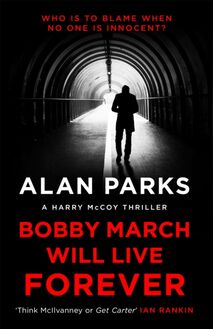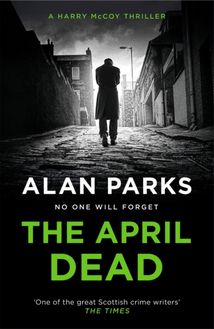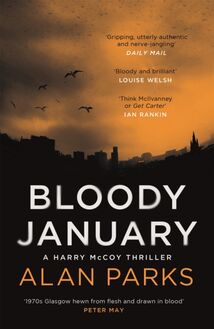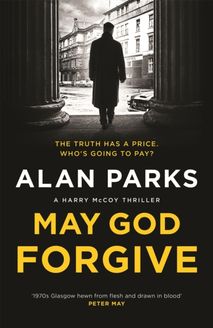Bobby March Will Live Forever , livre ebook
187
pages
English
Ebooks
2020
Vous pourrez modifier la taille du texte de cet ouvrage
Obtenez un accès à la bibliothèque pour le consulter en ligne En savoir plus
Découvre YouScribe en t'inscrivant gratuitement
Découvre YouScribe en t'inscrivant gratuitement
187
pages
English
Ebooks
2020
Vous pourrez modifier la taille du texte de cet ouvrage
Obtenez un accès à la bibliothèque pour le consulter en ligne En savoir plus
Publié par
Date de parution
05 mars 2020
Nombre de lectures
0
EAN13
9781786897169
Langue
English
Publié par
Date de parution
05 mars 2020
Nombre de lectures
0
EAN13
9781786897169
Langue
English
Alan Parks has worked in the music industry for over twenty years. His debut novel Bloody January , the first in the Harry McCoy series, was shortlisted for the Grand Prix de Littérature Policière. He lives and works in Glasgow. Bobby March Will Live Forever is the third Harry McCoy thriller.
Also by Alan Parks
Bloody January
February’s Son
The April Dead
The paperback edition published in 2021 by Black Thorn, an imprint of Canongate Books
First published in Great Britain, the USA and Canada in 2020 by Canongate Books Ltd, 14 High Street, Edinburgh EH1 1TE
blackthornbooks.com
Copyright © Alan Parks, 2020
Extract from The April Dead copyright © Alan Parks, 2021
The right of Alan Parks to be identified as the author of this work has been asserted by him in accordance with the Copyright, Designs and Patents Act 1988
Excerpt from ‘So You Want to Be a Rock ‘n’ Roll Star’ by The Byrds,written by Jim McGuinn and Chris Hillman © TRO ESSEX Music Limitedof Suite 2.07, Plaza 535 Kings Road, London SW10 0SZ. Internationalcopyright secured. All rights reserved. Used by permission.
British Library Cataloguing-in-Publication Data A catalogue record for this book is available on request from the British Library
ISBN 978 1 78689 718 3 eISBN 978 1 78689 716 9
CONTENTS
13th July 1973
ONE
TWO
THREE
FOUR
FIVE
14th July 1973
SIX
SEVEN
EIGHT
NINE
TEN
ELEVEN
15th July 1973
TWELVE
THIRTEEN
FOURTEEN
FIFTEEN
SIXTEEN
SEVENTEEN
EIGHTEEN
NINETEEN
TWENTY
TWENTY-ONE
TWENTY-TWO
16th July 1973
TWENTY-THREE
TWENTY-FOUR
TWENTY-FIVE
TWENTY-SIX
TWENTY-SEVEN
TWENTY-EIGHT
TWENTY-NINE
THIRTY
18th July 1973
THIRTY-ONE
THIRTY-TWO
THIRTY-THREE
THIRTY-FOUR
THIRTY-FIVE
19th July 1973
THIRTY-SIX
THIRTY-SEVEN
THIRTY-EIGHT
THIRTY-NINE
20th July 1973
FORTY
FORTY-ONE
FORTY-TWO
FORTY-THREE
21st July 1973
FORTY-FOUR
FORTY-FIVE
FORTY-SIX
FORTY-SEVEN
FORTY-EIGHT
FORTY-NINE
22nd September 1973: Two months later
Acknowledgements
Extract of The April Dead
For Pamela Hunter and for Dale Barclay
‘Control thy passions lest they take vengeance on thee’
– Epictetus
‘So you want to be a rock ‘n’ roll star’
– The Byrds
It’s Billy the desk sergeant that takes the call. A woman on the phone, breathless, scared, half crying. She says, ‘I’d like to report a missing child.’
And suddenly everything changes.
When news of a call like that comes in, everyone sits up at their desks, stops filling in their pools coupon, puts down their half-eaten rolls. The ones with kids open their wallets under their desks, look at the pictures of Colin or Anne or wee Jane and thank God it’s not theirs that have gone. The young ones look serious, try not to imagine pulling some weeping toddler from a cellar or from under a bed, being congratulated by the boss, thanked by a tearful mother.
Those that are religious cross themselves or say a silent prayer to keep the kid safe. And those that have lived through a case like this before say hello to the familiar dread and fear in their stomach, the knowledge that there is no end of bad things that men can do to children, that the missing child might be better off dead already.
And like a pebble dropped in the water, the ripples start to spread throughout the city. No matter the lockdown, news of a missing child always gets out. Cops come home, tell their wives and girlfriends not to tell anyone but they do. A shilling drops in a phone box across the road from the station, a reporter at the Daily Record answers and a beat cop earns a tenner for his trouble. Isn’t long until the boys selling the papers outside Central Station are shouting ‘Final edition! Missing girl!’
And before you know it the missing girl is all the city is talking about. It’s all the cops talk about when they assemble in church halls to get instructions for the search, all the reporters talk about – how they can get to the parents, taking bets on when she’ll be found. It’s all the kids in the back courts talk about, whispered rumours and stories about being dragged into a car.
And as the night falls and the chatter dies down there’s still one person who doesn’t know what Glasgow is talking about. Alice Kelly. She’s the one person who doesn’t know that all of Glasgow is talking about her. All she knows is that she’s got a cloth bag over her head, that her hands are tied and that she’s wet her pants. And there’s one other thing Alice knows. It doesn’t matter how hard she cries for her mum, her mum can’t hear her. Nobody can.
16th February 1964
Glasgow
The train was freezing but he didn’t care. The 6.15 to King’s Cross. He was really going. Tom had brought a bag of cans with him, handed them out as they left Central. They were drinking them now. Him, Scott, Barry and Jamie. All of them feet up on the seats, full of chips, smoking away. Telling jokes. Pretending they weren’t nervous.
Bobby sat forward and checked his pocket again. It was there, just like every other time he’d checked. The contract he’d had to beg his dad to sign. Couldn’t sign it himself, too young, only seventeen. His dad said he should become an apprentice, steady money, but no way was he doing that. Two weeks of sulking and begging and eventually his dad gave in.
He couldn’t believe it when he saw it. Parlophone written at the top of it. Just like The Beatles. Exclusive rights to the music of The Beatkickers. Wee Bobby March from Arden, him, in a train going to London to do a recording session for the same label as The Beatles. Tom said it would be fine, told him not to worry about it, that he was the only one of them that could actually bloody play.
He looked round the carriage. Tom wasn’t wrong. Jamie was a half-decent drummer when he tried. Scott couldn’t play the bass to save his life and Barry could hold a tune. Just. But that wasn’t all that mattered, Tom said. What mattered was that Barry was good-looking, very good-looking. And he knew it. Steel comb was never out his hand, fixing his hair, wee backcomb to give it height, then a perfect blond fringe. Clothes always right, whitest teeth Bobby had ever seen.
The carriage door slid back and Tom was standing there. Polo neck and a pair of denims. Was a big guy, Tom, six foot odds, strong. Used to work on the furniture vans. Now he was the Beatkickers’ manager, had bought them the suits and everything. And they were going places. He clapped his hands.
‘All good, boys?’ he asked.
They nodded, held up the cans in cheers.
Scott dropped his chin to his chest, burped loudly. They all started laughing.
‘Dirty bugger,’ said Tom, pretended to give him a clout over the ear. Scott swerved, almost fell off the seat.
‘That’ll teach you,’ said Tom. Then he pointed at Barry. ‘You, son, you come wi’ me for a minute.’
Bobby took a swig of his warm beer, wondered why it was always Barry Tom needed to talk to. Maybe he was giving him tips about tomorrow, microphones, that sort of stuff. Barry stood up, followed Tom out the door. Scott burped again. They laughed again.
13th July 1973
ONE
McCoy looked at his watch. Quarter past eight. The call had come in just before six last night, so fifteen hours or so she had been missing. The time for her to have got lost or stayed at a pal’s was long gone. A thirteen-year-old girl doesn’t go missing for fifteen hours, overnight, without something being very, very wrong.
He turned into Napiershall Street and swore. Any hope he’d had of having a quiet look around was gone. The circus had already come to town. Concerned-looking mums with weans in their arms talking to each other in hushed voices, kids attracted by the police cars, a few press blokes he recognised from the dailies sitting on the wall smoking, waiting for any new developments. Evening Times photographer wiping the lens of his camera with his tie. Four or five panda cars parked outside the pub and an incident van set up across the road. Was even some nutter with a sandwich board with a biblical quote on it walking up and down, handing out tracts. He swore under his breath, crossed the road and headed for the entrance.
The doors of the Woodside Inn had been wedged open to try and let some air in. He stepped in and realised it wasn’t doing much good, was even hotter inside. A few shafts of light from the closed-over shutters pierced the fog of dust and cigarette smoke, making the place feel more like a church than a Maryhill pub. Took his eyes a few seconds to adjust to the gloom, to see how much the Woodside had changed.
Wasn’t really a pub any more, was now a temporary Police HQ. Twenty or so uniforms, hats off, sleeves rolled, were sitting on the benches at the back being handed door-to-door assignments by Thomson. A big map of the surrounding area – Maryhill, North Woodside, Firhill – was laid out on one of the tables, corners held down by Johnnie Walker water jugs. Map was marked into sections, some of them scored off already. A young policewoman was wandering round with a tray of pint glasses full of water, handing them out to everyone. Two blokes in boiler suits were trying to connect three navy-blue telephones sitting on the bar, while the landlord sat on a stool at the side looking like he didn’t know what had hit him, fag in one hand, pint in the other.
The door to the Gents opened and the one person McCoy didn’t want to see came out, wiping his hands on a paper towel. Bernie Raeburn in all his portly glory. Raeburn was one of those men that took a bit too much care over what they looked like. Brylcreemed hair, neat moustache, silver tie pin, shoes shined. Probably thought he looked quite the thing. To McCoy, he just looked like what he was: a wide boy. Raeburn dropped the paper towel into a bin by one of the tables and peered over at McCoy. Didn’t look happy to see him. Didn’t look happy at all.
‘What you doing here?’ he asked.
‘Was at a call round the corner. Just came to see if there was an




